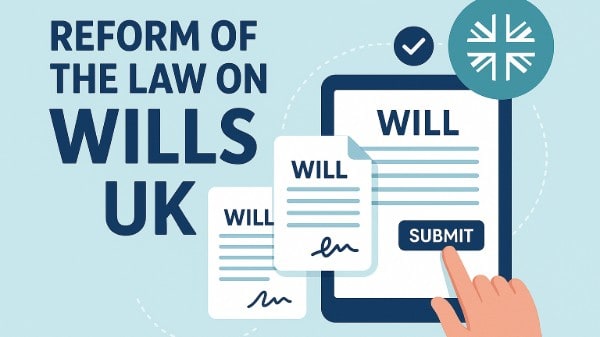Date
29 August 2025
Issue
Wills in Transition: Flexibility, Digital Change and Safeguards for the Future
Summary
The Wills Bill 2025, introduced by the Law Commission, seeks to reform the centuries-old framework of the Wills Act 1837, clarifying the law and updating it to reflect modern society. The proposals include the introduction of digital wills, stronger protections for vulnerable testators, and greater flexibility through measures such as lowering the age of testamentary capacity and recognising informal wills. These reforms have been met with broadly positive responses from legal professionals, sector bodies, and charities, while the government has confirmed it will give the recommendations detailed consideration.
Key Proposed Changes: Electronic Wills and Remote Witnessing
The Wills Act 1837 only recognises paper wills signed by in-person witnesses. The Commission proposes permitting electronic wills and making remote witnessing a permanent feature, with safeguards to ensure the process is “safe and reliable.” The Law Society described this recommendation as “a vital step in making will-making accessible for modern life, provided that appropriate safeguards protect the vulnerable”. Similarly, STEP (Society of Trust and Estate Practitioners) welcomed the proposal, noting that “digitalisation should not come at the expense of certainty or security.” Revocation by marriage or civil partnership under current law automatically revokes an existing will.
The Bill proposes ending this rule to protect better vulnerable testators, particularly older individuals who may be at risk of predatory marriages. As the charity Hourglass, whose mission is to prevent elder abuse, has highlighted, this reform “could play a crucial role in preventing exploitation of older people, ensuring their assets remain directed towards their intended beneficiaries.” If a spouse feels inadequately provided for, they could still bring a claim under the Inheritance (Provision for Family and Dependants) Act 1975, but the automatic revocation safeguard would no longer override the testator’s autonomy.
Evidence of Undue Influence
Proving undue influence concerning wills is notoriously tricky, as courts require direct evidence. The new proposals lower this threshold, allowing courts to infer undue influence where reasonable grounds exist. Practitioners have welcomed this shift. A solicitor at Irwin Mitchell commented that “this change will make it significantly harder for abusers to exploit the elderly or vulnerable behind closed doors, where direct evidence is almost impossible to produce.”
Testamentary Age and Capacity
The Bill also recommends lowering the testamentary age from 18 to 16, ensuring that young people’s wishes can be respected, particularly where they have their assets. The capacity test would also move away from the historic Banks v Goodfellow (1870) standard and instead align with the Mental Capacity Act 2005, a more modern and functional framework. The Law Commission has described this as an effort to bring “greater consistency across the law of capacity,” while mental health charities have welcomed the shift as “recognising the nuanced realities of capacity in the 21st century.”
Informal Wills
Finally, the Bill proposes that courts should have discretion to uphold informal wills, even if formalities are not strictly complied with, so long as the testator’s intentions are clear. This would prevent harsh outcomes under the current law, where technical errors can automatically render a will invalid. STEP has praised this reform, saying it “balances flexibility with judicial oversight, ensuring genuine wishes are not defeated by formality.”
Future Outlook
Taken together, the reforms represent a shift towards a more flexible and accessible system that is better suited to modern society, while also seeking to protect vulnerable testators from abuse or exploitation. Some elements may appear ambitious — for example, the idea that making a will could one day be as simple as using a phone, or that a will might still be valid even if it does not fully meet traditional formalities. Yet these proposals reflect a genuine effort to modernise succession law and ensure it works for a broader range of people. Overall, the reforms are both practical and forward-looking, offering a valuable opportunity to rethink how wills should be made, interpreted, and safeguarded for the future.
